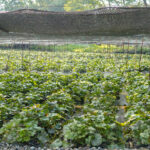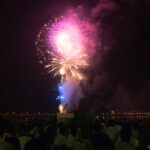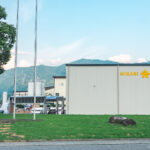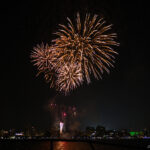This post may contain affiliate links. Please read our disclosure policy.
Lake Suwa in Nagano offers hot springs, historic shrines, sake breweries, and one of Japan’s largest fireworks festivals.
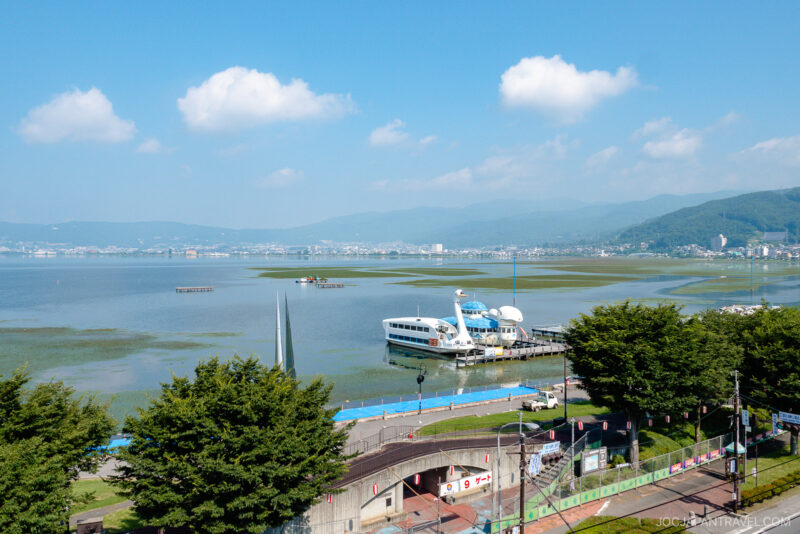
Where is Lake Suwa?
Lake Suwa sits in the center of Nagano Prefecture, about 2.5 hours from Tokyo by train or car. The lake is roughly 16 kilometers around, which takes about 30 minutes to circle by car. With mountains on all sides, the area feels like a natural bowl filled with seasonal beauty.
Seasonal Highlights at Lake Suwa
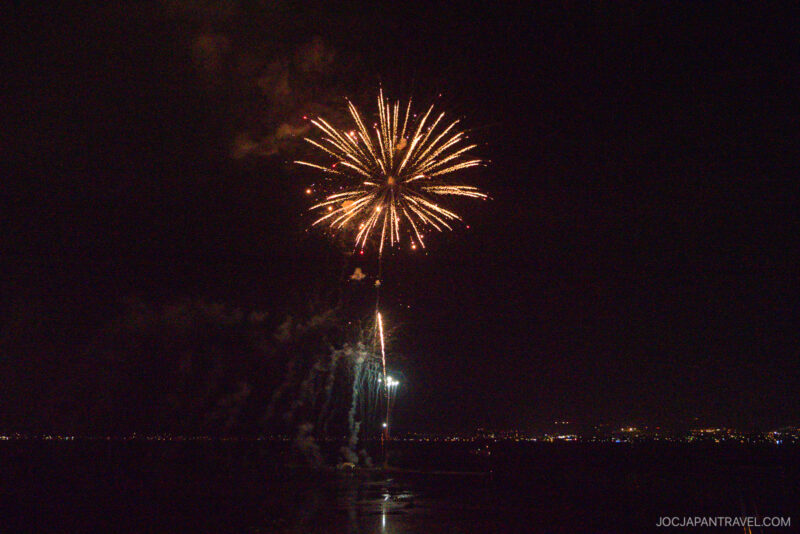
We visited in summer for the fireworks, but Lake Suwa is a year-round destination.
- Winter – If conditions are right, cracks form across the frozen lake in a rare natural event called Omiwatari (御神渡り, God’s Crossing).
- Spring – Cherry blossoms bloom around the lake and at nearby Takashima Castle.
- Summer – Daily fireworks light up the sky in August.
- Autumn – Mountains around the lake glow with fall colors, best enjoyed on a lakeside walk or drive.
Visit Suwa Grand Shrine (諏訪大社)
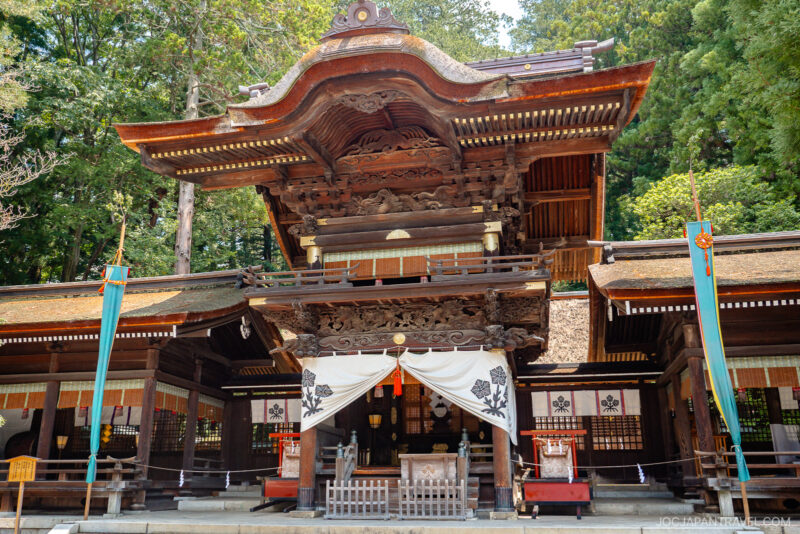
Suwa Taisha is one of Japan’s oldest Shinto shrines. It actually consists of four shrines—two upper shrines and two lower shrines—spread across the region. We visited the lower shrines, which were easier to reach and still awe-inspiring.
Instead of a main sanctuary, the natural surroundings themselves are considered sacred. The shrine’s legends connect to mountain worship and the famous Onbashira Festival, held every six years, where locals haul and ride giant logs down steep slopes in a dramatic ritual.
Lake Suwa Geyser Center and Footbath
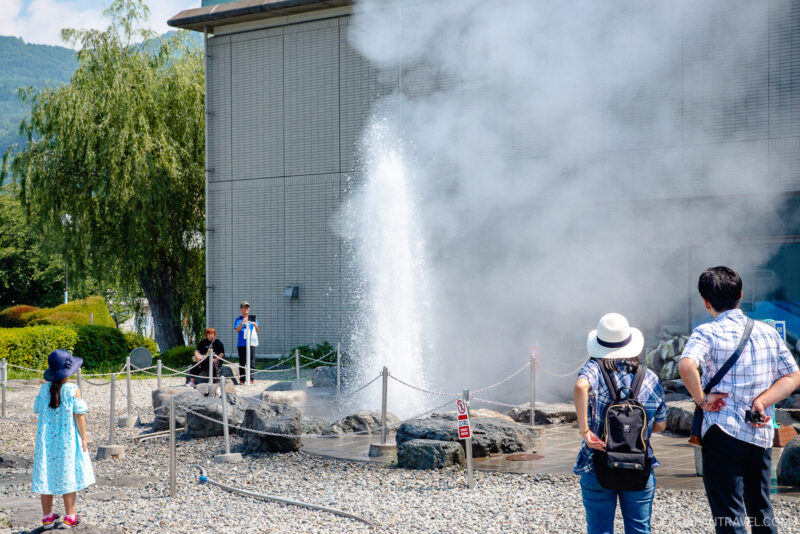
The Geyser Center sends hot spring water shooting 30 feet into the air several times daily. Inside, small exhibits highlight the area’s fireworks history and local culture. Right outside, a free footbath offers a welcome break for tired feet.
Katakurakan Onsen
Built in 1928, Katakurakan is a historic bathhouse with a massive Western-style bath that fits 100 guests. The retro architecture adds to the experience, and the mineral-rich water is perfect after a day of sightseeing.
Suwa City Museum of Art
Just behind Katakurakan, this museum is one of the oldest public art museums in Japan. It features both Japanese and Western works and serves as a quiet cultural stop.
Explore Local Sake Breweries
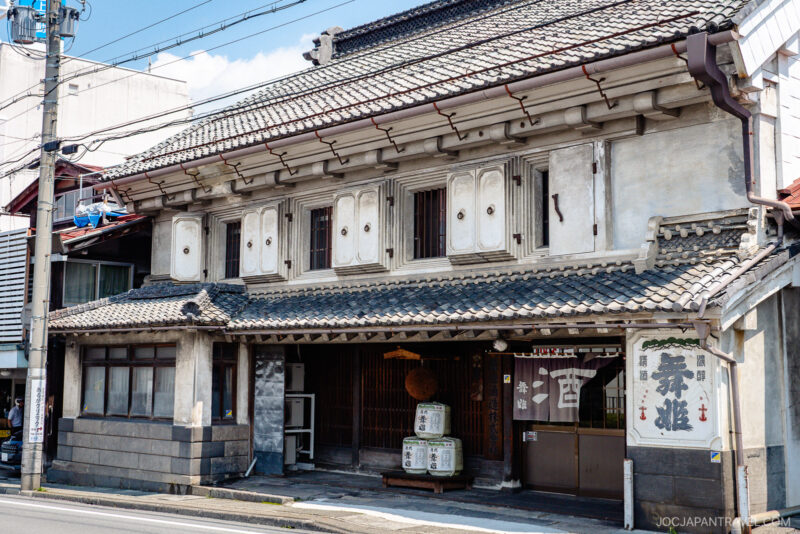
Suwa’s pure mountain water is ideal for brewing sake. Five breweries are within walking distance on the southern shore. We visited Reijin and Maihime, but the most famous is Miyasaka Brewing, makers of Masumi sake. Many offer tastings, and smaller bottles make great souvenirs.
Takashima Castle
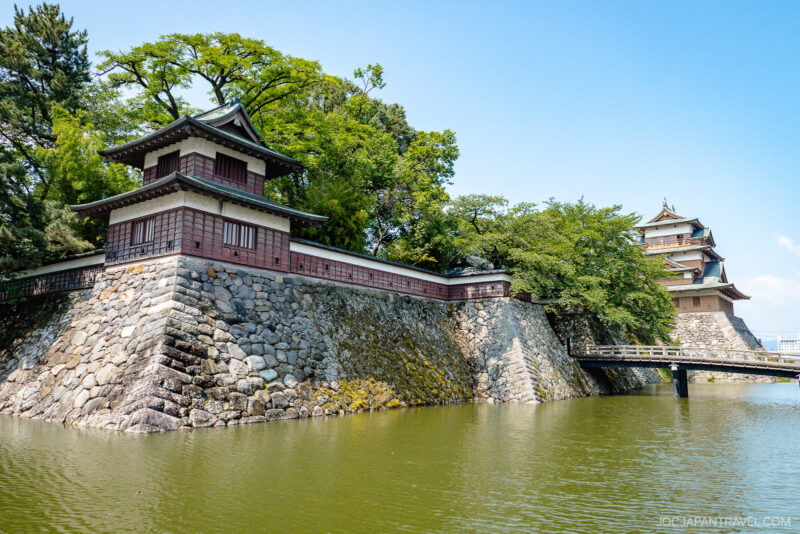
Once surrounded by the lake, Takashima Castle is nicknamed the “Floating Castle.” The reconstructed keep houses exhibitions on the Suwa clan and offers views of the lake from the top floor. The gardens are especially pretty during cherry blossom season.
Lake Suwa Fireworks Festival
Every August, nightly fireworks displays light up the lake, culminating in one of Japan’s biggest fireworks festivals with over 40,000 shells. Watching them reflect over the water was a highlight of our summer trip.
Pro Tip: Book a hotel early if visiting in August—lake-view rooms sell out quickly.
Local Cuisine Around Lake Suwa
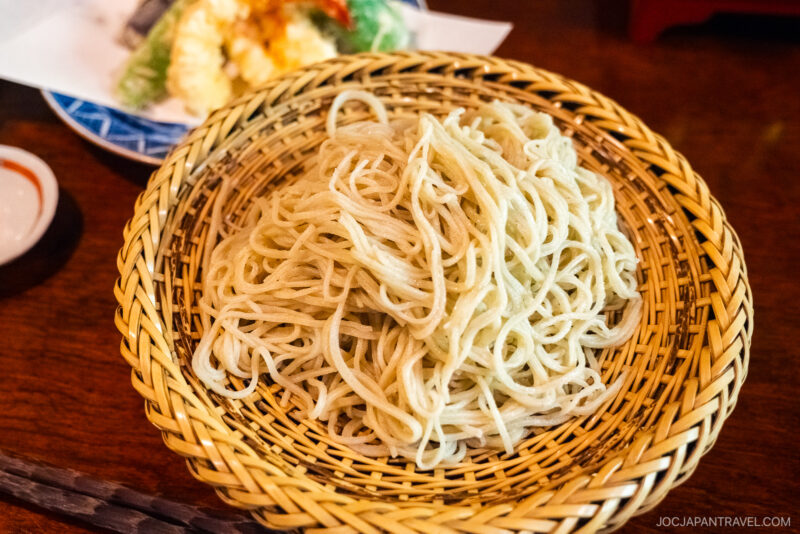
- Sauce Katsu Don – Crispy pork cutlet over rice with a tangy brown sauce.
- Handmade Soba – We had outstanding soba and tempura at Soba Akishino, set in a traditional house with a garden.
- Unagi (Freshwater Eel) – Suwa is known for its eel dishes, which we’ll try on our next visit.
Where We Stayed: Hotel Suhaku
We stayed at Hotel Suhaku, a short walk from Kami-Suwa Station. The top-floor onsen and the view of fireworks from our room were highlights. The meals were good, though less refined than other ryokan dining we’ve experienced in Japan.
How to Get to Lake Suwa (諏訪湖)
By Train
- From Tokyo: Take the Limited Express Azusa from Shinjuku to Kami-Suwa Station. The ride is about 2.5 hours with no transfers on most services.
- From Nagoya: Take the Chuo Main Line to Shiojiri, then JR Chuo Line to Kami-Suwa. Total travel is about 2.5–3 hours.
By Car
- From Tokyo: Take the Chuo Expressway west toward Suwa IC. Distance is about 180 km and takes 2.5–3 hours depending on traffic.
Local Transport
- Kami-Suwa Station is the most convenient stop for lake access, Katakurakan, and breweries. Use local buses or taxis for Suwa Taisha’s four shrine sites and Takashima Castle.
Pro Tip: Visiting in August for fireworks? Arrive early and confirm last train times. Lakeside traffic and crowds increase in the evening.
Is Lake Suwa Worth Visiting?
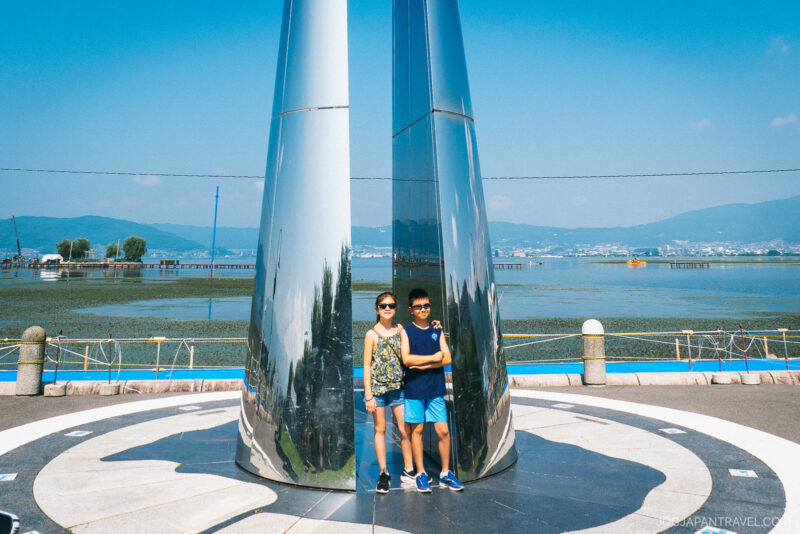
Lake Suwa combines spiritual history, seasonal events, and lakeside fun in one compact area. From soaking in an onsen and sampling sake to watching fireworks, there is something for everyone.
More to Explore Nearby
Once you’ve explored Lake Suwa, there are more Nagano highlights nearby:
- Matsumoto Castle – One of Japan’s original castles, just 40 minutes away.
- Utsukushigahara Highlands – Scenic plateau hikes with panoramic views.
- Shimosuwa Onsen – A quiet hot spring town near the lower Suwa shrines.
- Kirigamine Highlands – Rolling hills known for hiking and summer wildflowers.

